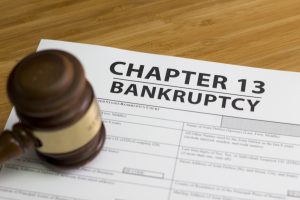
What kind of bankruptcy is a Chapter 13 bankruptcy?
A Chapter 13 bankruptcy is considered to be a reorganization bankruptcy, or wage earner’s plan. This type of bankruptcy allows those with a regular income to pay back their debt through a repayment plan organized by a bankruptcy court. This type of bankruptcy is helpful in that it allows you to keep your property while making up missed mortgage or car payments.
Why should I choose to file a Chapter 13 bankruptcy?
There are multiple reasons to choose to file a Chapter 13 bankruptcy, with the most common reasons being:
You Don’t Qualify for a Chapter 7 Bankruptcy
To qualify for a Chapter 7 bankruptcy your disposable income (income remaining after taxes and other mandatory payments are made) must be low enough to pass the Chapter 7 Means Test. This test analyzes your income and expenses to see if you have the means to repay at least some of your debt. If you don’t pass the Chapter 7 Means Test, you will be required to file a Chapter 13 bankruptcy instead.
You Have debts that are Not Dischargeable Under Chapter 7 Bankruptcy
Some debts will not be discharged by a Chapter 7 bankruptcy but will be discharged with a Chapter 13 bankruptcy. Therefore, a Chapter 13 bankruptcy would be more beneficial. If you have questions about the types of debts you have, give me a call and I can let you know which type of bankruptcy would best discharge your debt.
You Want to Repay Your Debt
Over the course of a three to five year period, you will make monthly payments to work toward effectively paying off your debt. For this to work, you must have enough disposable income to cover the payments. By repaying your debt, you can avoid foreclosure or repossession of your car.
You Need to Save Your Home from Foreclosure
Filing Chapter 13 bankruptcy is the best way to put a stop to the foreclosure of your car. It is much less likely for you to be able to keep your home if you are behind on mortgage payments and file a Chapter 7 bankruptcy.
You Need to Stop the Repossession of Your Car
Chapter 13 bankruptcy can also assist in stopping the repossession of your car. This is especially useful if your car was purchased at least two years before your bankruptcy case. The amount you owe on your loan may be eligible for a reduction, which would allow you to just pay the amount the vehicle is worth, plus interest, as a part of your repayment plan. This is especially beneficial if you owe more on your loan that the vehicle is worth.
You Want to Keep Nonexempt Property
With a Chapter 7 bankruptcy, a trustee (a person with responsibility to handle your property and money) can sell nonexempt property in order to pay creditors back. Chapter 13, on the other hand, allows you to keep nonexempt property in exchange for repayment to unsecured creditors if an amount is at least equal to the value of the property that would have been sold by the trustee in a Chapter 7 bankruptcy case.
You Have a Codebtor
Chapter 13 bankruptcy protects codebtors from the liability of a joint debt if the creditor is being paid as a part of the structured payment plan. Chapter 7 bankruptcy, on the other hand, eliminates your personal liability for the debt but keeps the codebtor responsible.
Who can file for a Chapter 13 bankruptcy?
Individuals (including sole proprietors) are the only people able to file for a Chapter 13 bankruptcy.
What are the eligibility guidelines?
Chapter 13 bankruptcy does not have a limitation on income but does require you to have some form of regular income.
How long does it typically take to receive a discharge?
A discharge will be given upon completion of all plan payments. This usually takes a course of three to five years.
What is the main advantage of a Chapter 13 bankruptcy?
The main advantage of a Chapter 13 bankruptcy is that you get to keep your property while catching up on missed mortgage, car, and nondischargeable priority debt payments.
What are the disadvantages of a Chapter 13 bankruptcy?
There are two main disadvantages to a Chapter 13 bankruptcy. First, you must make monthly payments to your trustee for three to five years. Second, you may have to pay back a portion of your general unsecured debts.
If you think Chapter 13 bankruptcy is the right step for you, contact me to get started. I can answer any other questions you may have and can get started on your bankruptcy case in less than ten minutes!